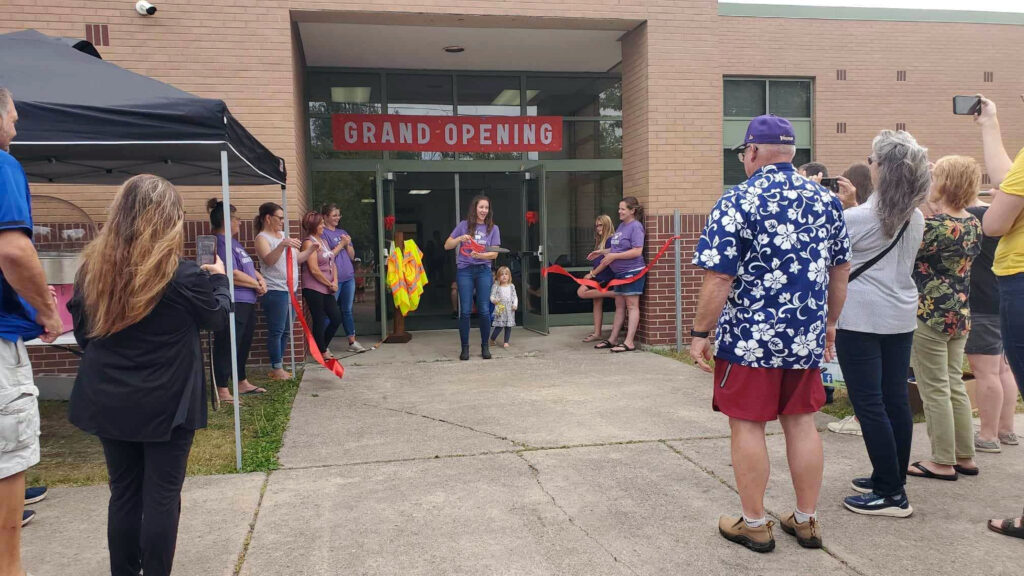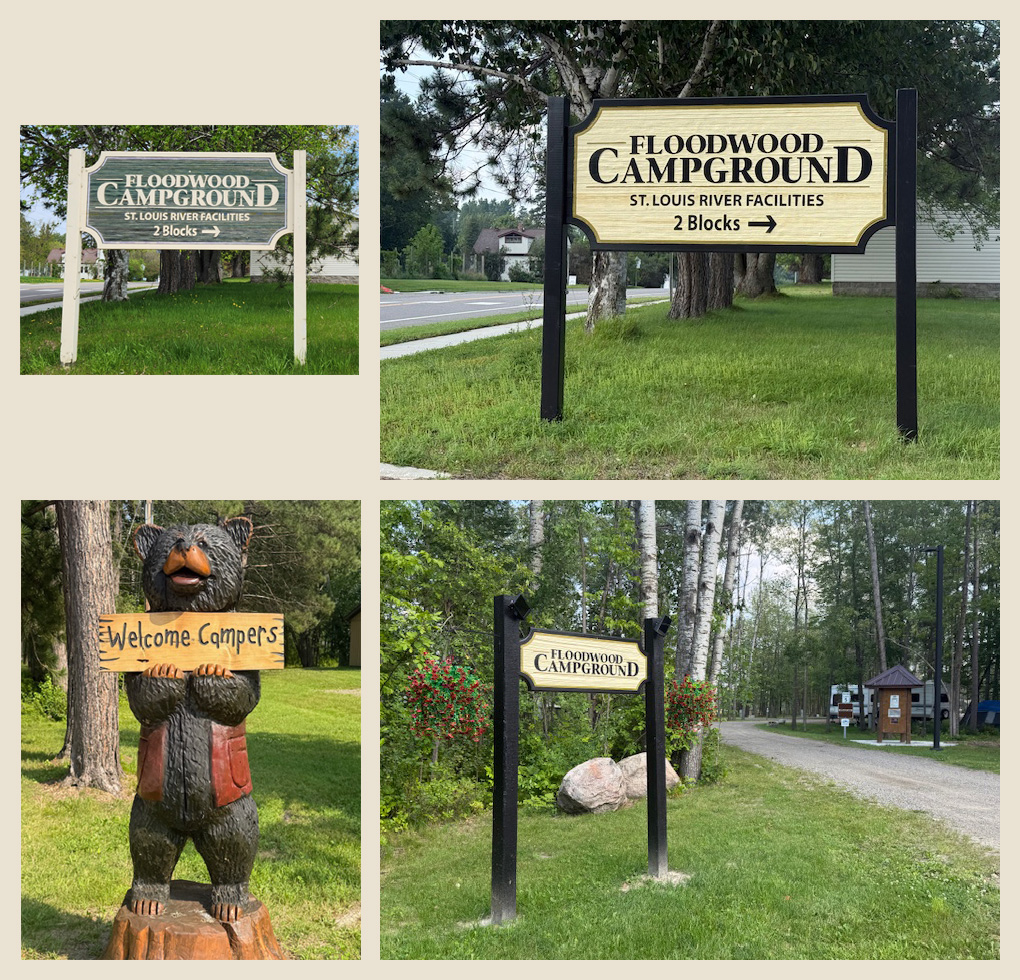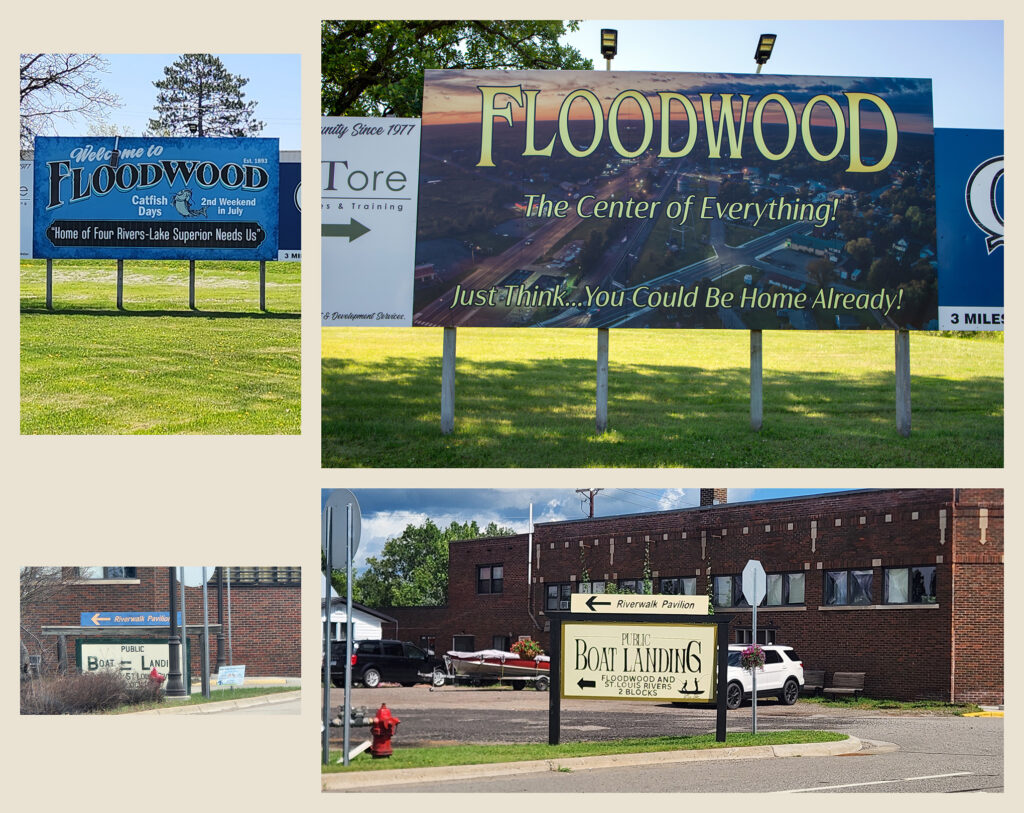 Image: Blog hero Plant Plate 09 boys dig in
Image: Blog hero Plant Plate 09 boys dig in
Helping a Small Town Team Dream Big

by Blandin Foundation Posted in Grants, Rural Placemaking, Small Communities
A new partnership with CEDA is allowing Floodwood’s city office to fill capacity gaps
When rural municipalities have limited budgets with which to accomplish a long list of vital tasks, it’s not uncommon for city staff to make difficult cuts to placemaking projects they otherwise champion. Such was true for the city of Floodwood, located in Saint Louis County about 35 miles southeast of Grand Rapids, which in 2022 found itself striking a highly requested upgrade from its slate of projects.
The city had received state funding to renovate its popular municipal campground on the Saint Louis River, and the plan had originally included updates to the site’s playground equipment to provide a safe and welcoming space for both children visiting the campground and Floodwood area residents. These improvements unfortunately had to be cut from renovation plans to allow for other more pressing updates.
“When it became clear that we would need to scale back due to budget limitations, it was disappointing for our Parks & Recs committee and city council members, especially because we knew how much our community values outdoor recreational opportunities for families and children,” said City of Floodwood Deputy Clerk Cory Suonvieri. “It’s always a balancing act — trying to make the most of limited resources while keeping community needs and priorities in mind.”
In the process of seeking funding to finish out the playground project, Floodwood staff learned about Community and Economic Development Associates (CEDA), a non-profit organization based in Chatfield, Minnesota, that helps cities, counties and businesses be more strategic and proactive with their developmental goals and projects.
“They offer grant writing, development expertise, and community-building support through a network of professionals with specialized skills,” Suonvieri told us. After learning about all of the benefits that a contract with the organization could provide, Floodwood staff applied for financial support from Blandin Foundation’s Small Communities Grant Program.
Like many cities in rural areas, Floodwood’s staff wear a number of different hats on any given day, and their team’s capacity can run thin. This can make applying for grant funding a daunting administrative task. Suonvieri, however, found the process with Blandin Foundation to be refreshingly simple.
“It was thorough but not overwhelming,” she shared. “Instead of requiring pages of formal documentation, they send grants program officers into the community to meet directly with grantees. Having [Blandin] come to Floodwood, sit down with us, and just talk about our needs and our progress made the experience not only easy, but one that left us feeling supported, not just funded.”
Part of the $150,000 Blandin Foundation grant received by the city of Floodwood went to a two-year contract with CEDA to tackle key challenges that couldn’t be addressed internally due to limited capacity and staffing issues. The organization’s first major contribution to the city was a first impression report, in which members of the CEDA team visited Floodwood as outsiders, looking for both strengths and areas for improvement.
“They identified many local assets — like the riverwalk, access to the Floodwood and Saint Louis Rivers, our campground — but also highlighted missed opportunities,” Suonvieri told us. “For instance, trailheads and amenities weren’t well-signed or were hidden by brush, making it difficult for visitors to discover them. They also noted the lack of promotional materials for local events and suggested ways to improve the city’s online presence and downtown aesthetics. They’ve been a game-changer, providing a professional capacity our city staff simply don’t have.”
The Importance & Value of Placemaking Projects
In addition to securing a contract with CEDA, a portion of the grant funding from Blandin Foundation was allocated to solve another ongoing problem in Floodwood: a shortage in childcare providers and offerings. At one point, Floodwood was home to at least four in-home daycare programs to help serve the city’s 518 residents. In recent years, that number has dropped to just one in-home daycare located several miles outside town. In response to the urgent need, the city remodeled an empty portion of the Floodwood School building and partnered with a nonprofit organization to bring Polar Cubs Childcare Center to residents in September 2024.
“Blandin’s mission to support rural placemaking and community vitality made this grant a natural fit,” Suonvieri said. “That center is now funded and operational, with 55 children and 32 individual families served so far. It’s addressing a long-standing crisis in the community and helping support working families and local school enrollment.”
The small communities grant also included seed money to help finish off that initial campground playground project, which the city of Floodwood hopes to match through additional funding outreach. Insights from both Floodwood residents and CEDA have also helped Suonvieri’s team identify other projects — like a kayak rental station — that could someday help better realize the placemaking potential of Floodwood’s vibrant riverside assets.

“This grant brought momentum, structure, and professional development support to our small team working hard to serve our residents,” said Suonvieri. “It’s helping to spur important changes.”
Floodwood staff hope to continue working with CEDA after the initial two-year contract runs out and are thrilled at how the partnership and collaboration is already making the town they live in a place where people are eager to gather, raise their families, and invest in the future.
“In small towns like Floodwood, placemaking is more than just beautification. It’s about pride, identity, and survival,” Suonvieri said. “CEDA’s first impression report reminded us of just how many hidden gems our community already has, and how a little attention to signage, communication, and aesthetics can go a long way in making those gems visible to others. Rural communities like ours definitely thrive on connection — between people, between organizations, and between the past and future. Blandin’s investment helps us strengthen those connections. With the right support, even a small city like Floodwood can show what’s possible through resilience, teamwork, and community-driven change.”

